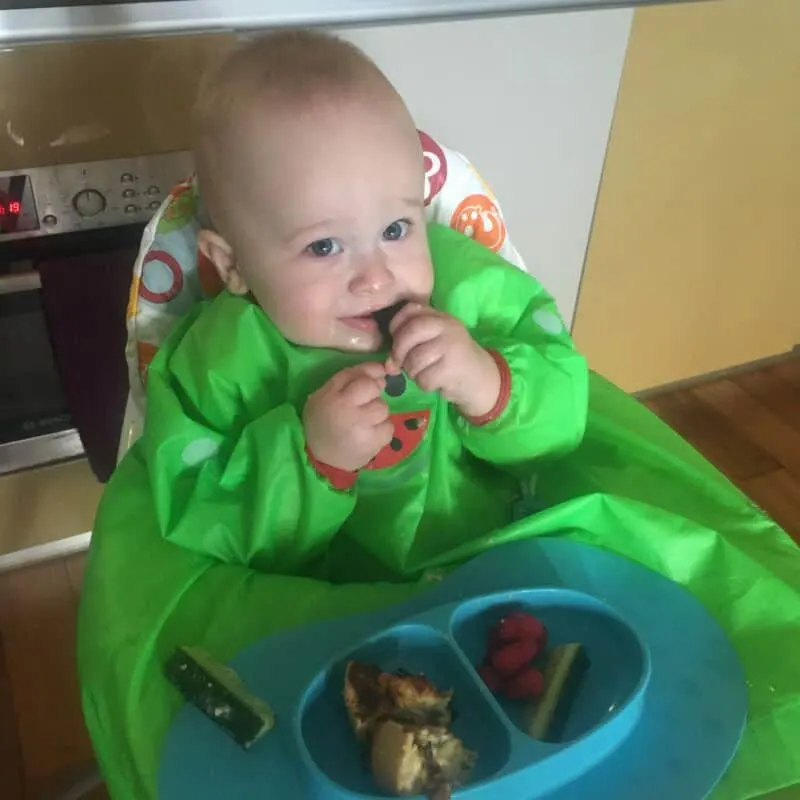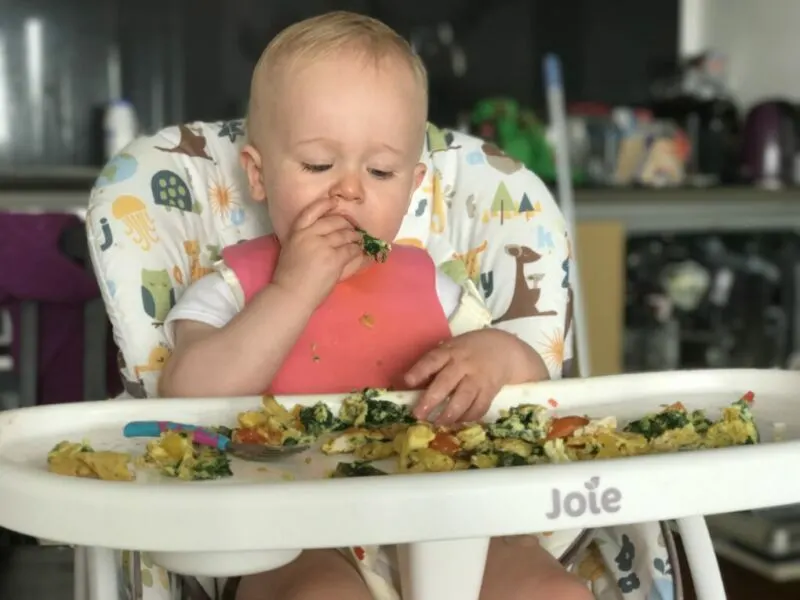If you’re a big foodie, or you happen to be Scottish and love your traditional foods, you may be wondering “can babies have black pudding?”. The good news is that, yes, despite being high in salt, babies can have black pudding in small amounts!
Black pudding can certainly become part of your child’s diet, especially if you have chosen to wean using the baby led weaning method. Before offering your baby black pudding, it is advisable to ensure your child has been exposed to meat products and is used to having textured foods. Before serving, ensure you’ve removed all outer packaging and cooked your black pudding until it’s piping hot to make sure no harmful bacteria are present.

A variety of foods and textures should be offered to your baby during the weaning process.
Weaning is an exciting time for parents! Introducing your child to your favourite foods, sharing meals, and watching your child’s face light up when they like the taste of something is an incredible feeling. Not only can babies have black pudding, but there are also so many other wonderful foods that you can try and experience together as a family.
Whilst your baby is young, weaning is just as much about exploring foods as it is about eating. Most babies will want to have several small meals a day and may request small snacks in between the set meal times. When planning the meals and snacks you want to introduce your child to, it’s important to include foods from each of the main food groups each day.
- Fruits and Vegetables
- Dairy Products
- Meat and Fish
- Grains
Let’s take a look at some of the most popular and interesting foods that you can offer your baby from each of the four food groups.

Fruits and Vegetables
Babies that love sweet flavours will enjoy both puréed and whole fruits and vegetables such as pears, broccoli, and a variety of berries.
Fruits and vegetables are all packed full of nutrients that help baby’s bodies to grow, so offering small amounts of this food group every day is a fantastic way to give your child something soft and scrumptious to enjoy, whilst also knowing that you are providing them with the foundation for healthy eating habits. If you plan on serving your baby berries, always make sure they’re cut or puréed so that your baby does not choke.
Dairy Products
You may be surprised to discover that the answer to can babies eat black pudding? is a ‘yes’, when you’ve also probably been warned not to give your baby raw cow’s milk until they’re over 12 months of age.
Cows’ milk can play a large role in your baby’s diet, but it cannot be given as a raw drink until your child is over the age of 12 months. Cows’ milk makes a great base for cooked dishes and can be used to create cooking sauces, porridge, and other hot meals.
Plain yoghurt is one of the most popular choices among parents when choosing what to feed their baby from the dairy food group. It can be fed on its own or mixed with fresh or puréed fruit, but be sure to never serve it with honey as this can introduce harmful bacteria to your baby’s body, resulting in botulism.
Full-fat pasteurised cheese and fromage frais can be given to babies from the age of 6 months, however, in order to minimise the risk of choking, you should grate cheese before allowing your child to eat it.

Meat and Fish
You probably won’t be surprised to discover that not only can babies have black pudding, but they can also eat and enjoy a huge variety of other meat products, and even some fish.
Although black pudding is quite high in salt, there are other meat products that your baby can eat. You may even be surprised to learn that meat is a nutrient-dense food that supports the proper growth and development of all organ systems. Meats, such as turkey, beef, pork, and chicken can all be given to babies aged 6 months and up, providing fantastic sources of protein, zinc, vitamin B12, iron, vitamin B6, selenium, phosphorus, and niacin.
Fish can also provide a great source of protein, iron, vitamin D, zinc, and omega-3 fatty acids. All of these nutrients and vitamins are essential for healthy growth and development, making fish a viable food choice for your weaning baby. However, unlike asking can babies have black pudding? asking whether your baby can eat fish doesn’t present you with such a simple answer.
This is because, although you can introduce fish to your baby’s diet at 6 months, it’s recommended that you do this without offering your baby any other type of food that could create an allergic reaction at the same time. This is because fish is one of the most common allergens and monitoring your child’s reaction to foods such as fish is a lot easier if it’s the only new addition to their diet. Not all fish is considered safe for babies either due to the high mercury content that naturally occurs in some species. For baby-safe fish, stick to salmon, trout, herring, sardines, and white fish such as cod and halibut.

Grains
Grains should also make up a good proportion of your baby’s daily food intake as they provide energy, nutrients, and fibre. While whole grain foods, such as wholemeal bread, pasta, and brown rice can be given to babies, it’s generally not recommended for those under 2 years old. This is because of the high fibre content; too much fibre can fill your child up before they’ve taken in the necessary calories and nutrients needed.
Other starchy foods, such as potatoes, yams, rice, and couscous can also be given to weaning babies and are particularly good foods to offer when introducing solids as part of baby led weaning.
How to prevent food poisoning and food bugs.
Making your baby’s own food is one of the fun things about weaning. You get to introduce your baby to your favourite foods, experiment with flavours and textures, and even share your own meals.
When preparing your baby’s food, there are some simple rules that you must follow, however, in order to avoid accidentally giving your baby food poisoning. In order to make sure you never put your baby at risk:
- Always wash your hands before preparing any of your baby’s food.
- To avoid cross-contamination, always wash your hands after touching raw meat, eggs, raw fish, raw vegetables, shellfish, and chicken.
- Teach your child the importance of washing their hands before eating and make sure they have clean hands before offering them food.
- Keep your kitchen clean and use antibacterial cleaning products when preparing the area for cooking.

Conclusion
Were you surprised to find out that the answer to can babies have black pudding was a yes? It’s true! Babies can eat black pudding, but only in small amounts due to the high salt content. In fact, when weaning your baby, sharing your food with them is a great idea as it allows them to experience new flavours and textures from a young age.
